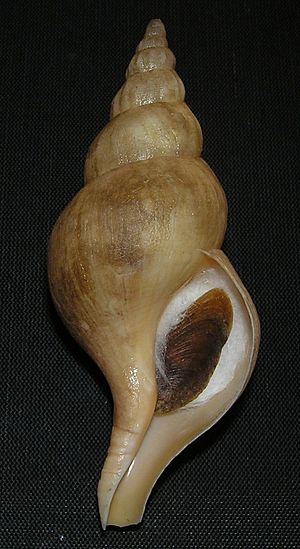Antarctoneptunea benthicola facts for kids
Quick facts for kids Antarctoneptunea benthicola |
|
|---|---|
 |
|
| Apertural view of a shell of Antarctoneptunea benthicola | |
| Scientific classification | |
| Kingdom: | |
| Phylum: | |
| Class: | |
| (unranked): |
clade Caenogastropoda
clade Hypsogastropoda clade Neogastropoda |
| Superfamily: |
Buccinoidea
|
| Family: | |
| Genus: |
Antarctoneptunea
|
| Species: |
A. benthicola
|
| Binomial name | |
| Antarctoneptunea benthicola (Dell, 1956)
|
|
| Synonyms | |
|
|
Antarctoneptunea benthicola is a type of sea snail. It's a small-to-medium-sized snail that hunts other creatures for food. These snails live in the ocean and are part of a group called gastropods, which includes snails and slugs. They belong to the Buccinidae family, often called "true whelks."
What Does It Look Like?
Antarctoneptunea benthicola is a marine snail. Its shell can grow up to 100 millimeters (about 4 inches) tall. The shell can also be up to 40 millimeters (about 1.5 inches) wide.
Where Does It Live?
This special snail only lives in New Zealand. You can find it in deep ocean waters. Its home stretches from the northern coast of the North Island all the way to the New Zealand Subantarctic Islands. Scientists have also found fossils of A. benthicola in the South Island. These fossils show it lived there during the Pleistocene epoch, a long time ago.
How Scientists Name It
This snail was once known by a different name, Penion benthicolus. But scientists use modern tools to learn more about animals. They looked at the snail's DNA and also studied the exact shape and size of its shell. These studies helped them understand its family tree better. They discovered that this snail actually belongs to the group Antarctoneptunea.
There was also a subspecies, Penion benthicolus delli. A subspecies is like a smaller group within a species. However, after more study, scientists found that this subspecies was exactly the same as other P. benthicolus snails. So, it is no longer considered a separate group.
See also
 In Spanish: Penion benthicolus para niños
In Spanish: Penion benthicolus para niños

